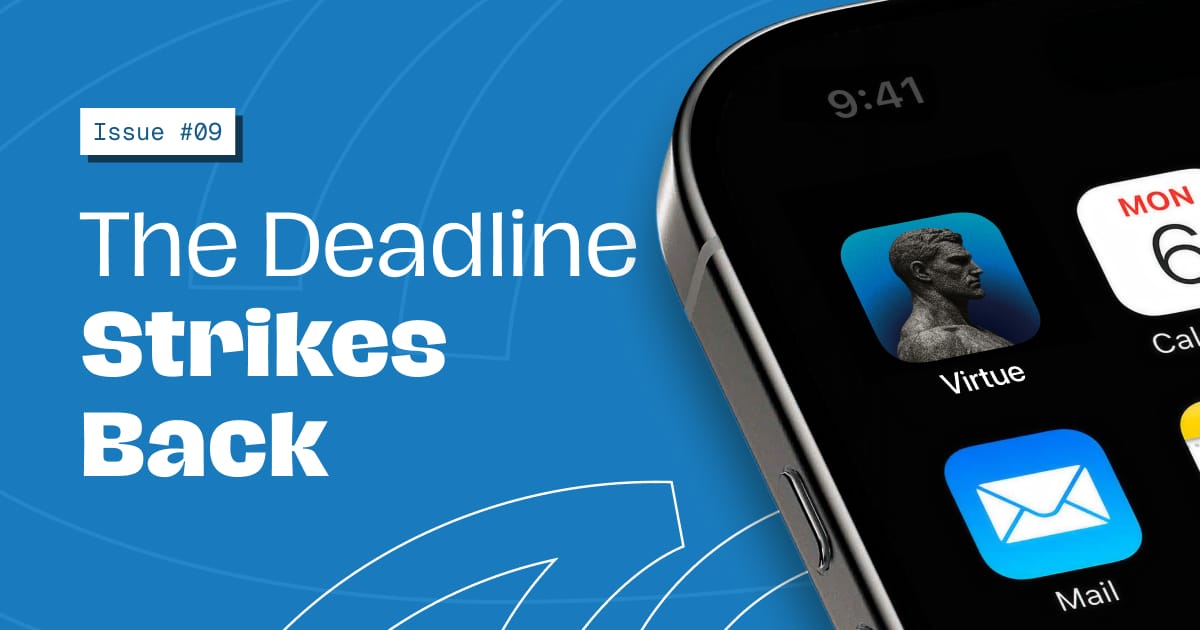
Never Tell Me The Odds!
The Answer You've Been Waiting For
Let's not dance around it: Virtue isn't shipping in 30 days.
If you've been following along, you know we set an aggressive public timer. We honored it, pushed through nights and weekends, redesigned everything with seven days left, and...we're not shipping.
Not because we couldn't. Because we won't.
There's a version of Virtue we could release tomorrow. It works. It tracks habits. It has most of the features we promised. But it's not the product we set out to build, and we refuse to compromise on the vision just to hit an arbitrary deadline we set for ourselves.
Here's what nobody tells you about building in public: The hardest moment isn't when things break or when you pivot. It's when you have to choose between keeping a public promise and keeping your product's soul.
We choose soul.
The Tyranny of the Timer (And Why We Needed It Anyway)
When we started this 30-day sprint, we knew the deadline was aggressive. What we didn't know was how much it would teach us.
The timer forced clarity. It killed our darling features. It made us ship updates daily instead of polishing in private. It created the urgency that turned "someday" into "today."
But here's the thing about arbitrary deadlines – they're both a gift and a curse.
The gift: Without that timer, we'd still be debating color palettes and reading philosophy books about virtue ethics. The constraint created momentum that two years of "thoughtful planning" never could have.
The curse: Sometimes the work reveals its own timeline. Sometimes you discover something in week four that fundamentally changes what you built in week one. Sometimes the difference between good and great is another two weeks you don't have.
We discovered our curse on day 23 when we finally found the aesthetic that made everything click. The writing hands. The aged paper. The sense of timeless wisdom meeting modern simplicity. It wasn't just a visual update – it was finding the product's soul.
You can't unsee your product's soul once you find it.
What "Done" Really Means (Hint: It's Not What's in Jira)
Here's a confession: According to our task list, Virtue is 87% complete. We could ship it. Users could download it. Habits could be tracked. Virtues could be... virtued?
But that 13% isn't just random features. It's the difference between an app that exists and an app that matters.
It's the micro-interaction when you complete a habit that makes you feel like you've carved something in stone, not just tapped a checkbox. It's the way the interface breathes when you open it, creating space for intention instead of rushing you to the next task. It's the progressive disclosure that reveals complexity only when you're ready for it, not when we're eager to show it off.
Most critically, it's the frequency recommendation system that adapts to your actual life instead of demanding robotic consistency. We built the "easy, medium, hard" progression, but the intelligence that moves you between them? That's in the 13%.
You know what's not in that 13%? The stuff that would make VCs happy. Social features. Gamification loops. Premium subscription upsells. The checkboxes that make apps "investable."
But our users aren't VCs. They're people trying to become who they want to be, one small action at a time. They deserve the full vision, not the MVP.
The 13% Checklist (Or: What Soul Actually Looks Like in Jira)
Here's what stands between us and shipping:
Micro-interactions that matter: Every habit completion needs to feel like you've carved something permanent, not tapped something disposable. We're crafting animations for key moments - completing a habit, leveling up in difficulty, achieving consistency milestones. Each one needs to reinforce that you're building character, not checking boxes.
The full habit library: We've built the system, now we need to populate it with the carefully curated habits that align with each virtue. Not just "drink water" but the specific actions that connect daily practice to character development. This isn't about quantity - it's about ensuring each habit serves its purpose.
Battle-testing with real humans: We need to expand our testing beyond the amazing early users who've been with us through the builds. More diverse use cases. More edge cases. More people using it in ways we never intended. The kind of testing that reveals the difference between what we built and what people actually need. Our current testers have been invaluable, but the final 13% needs fresh eyes to catch what familiar ones miss.
That's it. Not feature creep. Not scope expansion. Just the polish that turns a functional app into one worth keeping on your home screen.
The Real Cost of Choosing Quality
Let me paint you the complete picture of what this decision means:
For the team: Alan and David have been grinding alongside me, and pushing the deadline means asking them to extend their sprint. That's not just about hours – it's about momentum, morale, and the mental load of an unshipped product.
For our marketing: We built our entire launch strategy around that Tuesday deadline. The TikToks are planned. The landing page is ready. The rhythm is set. Pushing means losing that momentum and rebuilding it from scratch.
For our credibility: We've been building in public, timer and all. Missing our deadline means eating crow in front of everyone who's been watching. There's no hiding behind corporate PR speak when you've been transparent from day one.
For our business: Every day we don't ship is a day we don't learn from real users. It's a day without revenue, without feedback, without the market validation that only comes from people actually using your product.
But here's what I've learned: Shipping something you're not proud of costs more than all of that combined. It costs you the chance to build something meaningful. It costs you the opportunity to set a new standard. Most importantly, it costs you the integrity of your vision.
We can rebuild momentum. We can earn back credibility. We can find new marketing windows.
We can't unship mediocrity.
What This Actually Means for Virtue (And You)
So what happens now?
For Virtue: We're giving ourselves the time to build the 13% that matters. Not to add features, but to ensure every interaction reflects the gravitas of building character. We're talking weeks, not months. But weeks focused on soul, not scope.
For The Proofing Room: This newsletter continues its core mission – documenting our weekly journey building products at Torta Studios. You'll see us polish Virtue's final 13%, start our next product sprint (yes, probably a GPT-wrapper with soul), and share all the messy middle bits that most companies hide. When we kick off our next 30-day build, you'll be here for every pivot, breakthrough, and redesign. Think of this as the season finale before the next season begins.
For our next products: Remember how I mentioned we might need to build GPT-wrappers to keep the lights on? That's still true. But Virtue taught us something crucial – even our revenue plays need soul. Our next sprint might be AI-powered, but it'll still be opinionated, intentional, and built with the same transparency you've come to expect. The timer will be back, and so will the late nights.
For you: If you're building something and facing your own deadline demons, know this – the deadline serves you until it doesn't. Use it to create momentum, kill scope creep, and force decisions. But when you find your product's soul, have the courage to choose that over any arbitrary timer. Then set a new timer and do it again.
|
D.B. Fresh
|
|
The Lesson Nobody Wants to Learn
Here's the truth I wish someone had told me: The 30-day timer was never about 30 days. It was about committing publicly to something that scared us. It was about building momentum through accountability. It was about learning what we could accomplish under extreme constraints.
We accomplished all of that. We just didn't ship an app.
But we discovered something more valuable – we learned what it takes to build products that matter. Not just products that ship, but products that last. Products with soul. Products worth the extra weeks, the missed deadlines, and the public accountability.
The timer taught us to move fast. Missing the deadline taught us when to slow down.
Both lessons matter.
Still building in public, just on soul's schedule now,
Colin, Alan, and David (oh, and D.B. Fresh)
P.S. To everyone who's been following along and waiting to try Virtue – thank you for your patience. When you finally get your hands on it, you'll understand why we made this choice. The soul is worth the wait.
